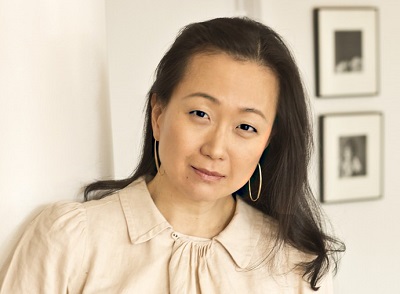
Pachinko, by Min Jin Lee
 Min Jin Lee spent 30 years working on Pachinko
Min Jin Lee spent 30 years working on Pachinko, an intriguing novel about Korean immigrants in Japan before, during, and after World War II. The story begins slowly, in the manner of a 19th century novel, with information about the family background of the main character, Sunja. She is born on a small Korean island to a couple who run a boarding house. Some years before her birth, Japan took over Korea, and Koreans had to live like second-class citizens in their own country. Also like a 19th century novel, Lee uses an omniscient point of view, dipping into the heads of many different characters to give readers a sense of what life was like in that time and place.
Early in the novel Sunja falls in love with, and is impregnated by, a wealthy, married man. She rejects him when she realizes he cannot marry her. Instead, she marries a Korean Christian minister who has been boarding at her mother’s house, and moves to Osaka, Japan with him.
Most of the novel takes place among the Korean community in Japan, and follows the trials and challenges faced by Sunja, her husband, his brother, and her sister-in-law. At that point I was fully invested in the characters’ lives. One of the conflicts is the women’s desire to earn money, which is opposed by Sunja’s brother-in-law. The family struggles to survive during World War II and the American bombing of Japan. Once Sunja’s sons become adults, the novel follows their stories, ending in 1989 (which, interestingly, is the year that Min Jin Lee got the idea for this novel). In my opinion, the novel is about 100 pages too long. Lee delves into the lives of not only Sunja’s descendants, but also the friends and lovers of those descendants, and I really just wanted to get back to Sunja herself, who is an appealing and memorable character.
For most of the novel, I was puzzled by the title. “Pachinko” is the name of a Japanese arcade game (like a vertical pinball game) that is used for gambling. Oddly, considering that the novel is titled after this game, the word “pachinko” doesn’t even appear until halfway through the novel. Pachinko is an important business in the Korean-Japanese community, it’s true, but why name the whole novel after this game? Then I came upon this passage: “There could only be a few winners and a lot of losers. And yet we played on, because we had hope that we might be the lucky ones. . . . Pachinko was a foolish game, but life was not” (p. 412). I realized that “pachinko” is a symbol for the lives of Koreans in Japan.
The photo above is from Min Jin Lee’s web site.